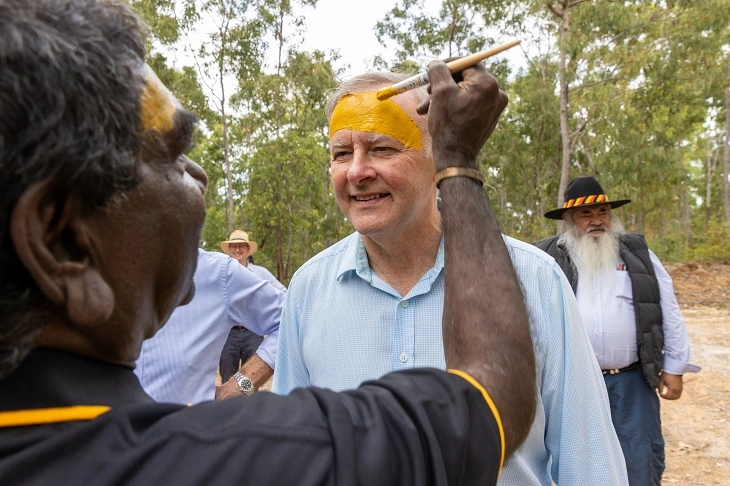



A copy of a Spectator article, (22nd July 2023), by Bev McArthur, Liberal member for Western Victoria Region giving details about secret agreements the Victorian Government has entered into with indigenous groups.
Just like a Danish pastry, Australia will become a flaky composition of treaties
By Beverley McArthur

Here’s looking at you, Western Australia.
Your Aboriginal Heritage Act has taken our national attention. We sit watching the unfolding of your big, burly state. When community tree-planting days can be cancelled because of the need for Indigenous sign-off, or a demand for $2.5 million, we know times are changing.
The fear of huge financial sanctions or jail is real. What individual can afford a $1 million fine, or corporation $10 million?
The Act also effectively strips away the autonomy of WA farmers. They feed the nation and the world. They, too, care deeply about the magic and mystery of those red soils.
The WA government clearly has no concept of what it has just unleashed.
But now, such manoeuvring may be starting elsewhere in this country.
So, here’s looking at you Victoria.
Off the back of a native title deal, an ‘expanded settlement package’ was signed last October between five Aboriginal groups in Western Victoria and the Victorian government. The deal is being managed by the Barengi Gadjin Land Council, BGLC.
Since then, all has seemingly been quiet until recently when a newspaper report broke the news that the state government had negotiated further deals under the ‘package’.
The deal covers ten Local government areas including the Councils of Mildura, the Northern and Southern Grampians, Pyrenees, Horsham, and Ararat – in all, the BGLC will command influence over nearly 36,000 sq km.
The councils were told about the revised agreement just last month – after the deal was done.
The Municipal Association of Victoria, MAV, admits it will change how councils operate.
The deal remains secret to the public, but the paper has viewed a copy. It says the agreement with the Wotjobaluk, Jaadwa, Jadawadjali, Wergaia, and Jupagulk Peoples (WJJWJ), recommends that councils:
Without trying to be cute, one assumes a council will have to ask their local tribe if they can plant camellias in a town’s botanical gardens, or native salt bush; daffodils or quangdongs.
The MAV says farmers can expect multiple impacts, yet to be revealed, but they would include things such as Indigenous access to Crown Land river frontages for ‘carbon capture initiatives’, or signoff to build bridges over rivers on private properties.
Already, a Natural Resource Agreement between the State of Victoria and the BGLC has been Gazetted, granting them the right of first refusal on such contracts.
But the ‘preferential’ treatment may now apply to a much broader range of council activities.
For example, the Indigenous council and its tribes could establish a stationery business, a nursery, an employment agency, audit or legal firm, a cleaning business, an IT and electrical goods company, a car yard, a catering enterprise, and so on.
The councils are then heavily encouraged to give preference to them – for pens and paper, trees and plants for local parks, for temporary staff, full-time staff, for legal and accounting advice, for computers and phones, catering needs, car leasing, or office cleaning.
What small town business in Western Victoria could compete against the Indigenous entity?
It could be business over for the non-Indigenous sector – and all this to provide what? Indigenous ‘self-determination’?
The government must tell Victorians what is really going on. Victorians should demand to know.
The WJJWJ will also co-manage 12 national parks in their region.
Until now, a push to put dingoes into the famous Grampians National Park has been stopped largely because it is surrounded by some of the nation’s best merino studs. One wonders if the deal will fling the Park doors open to dingoes, and tourists camping in the park should – in time – be as worried as those on Fraser Island currently getting nipped at.
The Victorian government is expected to sign its first blanket Treaty agreement with Victoria’s Indigenous population this year. It will allow for many smaller agreements to be made with separate Indigenous groups.
The WJJWJ deal may be a harbinger of what’s to come.
The state has also provided Victoria’s Indigenous population, including the First People’s Assembly, access to a $65 million self-determination fund (which can be topped up) so that they can be on an 'equal footing' when negotiating treaties with the government. What Victorian, or council, wouldn’t want access to a $65 million fund to be on an ‘equal footing’ with the Victorian government? The Commonwealth Games Federation probably wishes it had access too.
On top of this, the Victorian Premier is yet to confirm if he will spend taxpayers’ dollars to promote the ‘Yes’ case in the Voice referendum, the only Premier considering doing so.
What does all this mean for the non-Indigenous?
There will be State Treaties, and under the auspices of the Uluru Statement, a National Treaty will follow a ‘Yes’ vote, if that’s successful.
Australia will become the Danish pastry of Nations: a flaky composition of layer upon layer of treaty upon treaty baked into constitutional place.
The tiers are becoming apparent. Look, even, at the new Enterprise Agreement struck by the NAB. Its conditions include 'cultural leave for Indigenous staff'.
Do we take it then, that Italian workers, or Irish, Dutch, British, Samoan, or French do not have a culture? That there is only one culture that requires particular care in Australia? The answer is becoming yes. And here we were proudly thinking that we were a land of many, and equal, peoples.
It’s not just the cultural cost to the nation of the Voice in the form of division, but the actual cost.
During her address to the National Press Club, the Federal Indigenous Minister gave us a piece of the puzzle when she said, 'And it will co-operate with existing organisations.'
It will add another layer of bureaucracy: not remove, not replace, not refine, not streamline, but add.
Indeed, what is the point of the entire Voice proposal when everything outlined in Minister Burney’s address is already known today and could be dealt with today without the need for constitutional reform?
So, again, it begs the question: what are the 3,352 registered Aboriginal corporations, the 30 Land Councils, the Council of Peaks that umbrellas 70 Aboriginal Corporations, and the National Indigenous Australians Agency (NIAA) doing with their share of the almost $40 billion they get in government funding annually?
If the Voice is necessary because these expensive entities are failing their constituencies then, surely, they should all be made replaced with a shiny new way to success.
But Minister Burney’s words make it clear that won’t happen.
Before they sign up for more, Australian taxpayers are right to ask what they get for the $40 billion they provided on Indigenous spending across the nation. What, and where, are the measurable outcomes showing the decline in Indigenous disadvantage?
Spending from government sources on Indigenous Australians is double that on non-indigenous Australians. The Institute of Public Affairs, IPA, says that equates to roughly 75 per cent of the average Australian wage spent via a raft of government funding avenues. It puts the figures at $53,055 per Indigenous person and $26,425 per non-Indigenous person. The values are derived and expanded from the 2017 Indigenous Expenditure Report.
In any case, how do we define Indigenous? It’s important to know given ticking that box could become big business.
If Australians thought the cost of living was tough now, just wait for the Voice bills to start landing. Then the legal bills.
Watch for the Treaties to start changing the lives of everyday Australians.
Watch WA.
And watch Victoria.
Stop guessing about what the Voice will mean in 'practical terms' and start looking at what is already happening.
It is a strange thing that at the same time the US Supreme Court rules that race-based affirmative action is against the US Constitution – Australia is frantically trying to implement the opposite: entrenching division and preferential rights based upon one’s race.
Surely the holy grail of unity is not disunity.
Surely Closing the Gap should not open others.
* * * END OF ARTICLE * * *